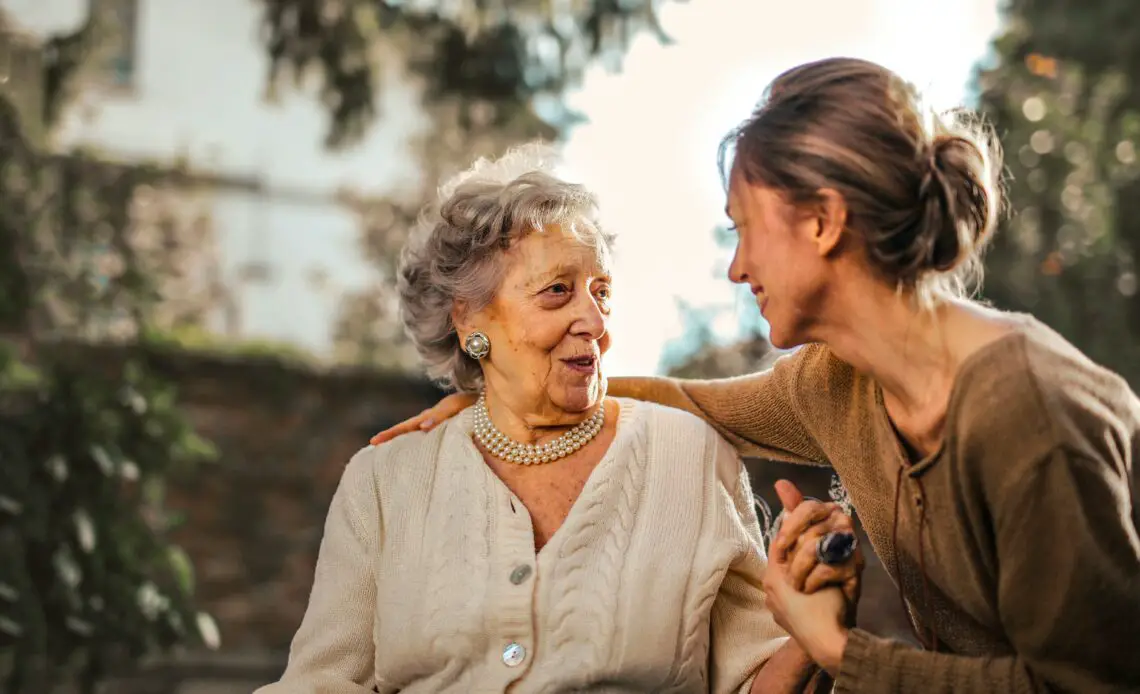
You have two hands. One to help yourself, and one to help others.
Audrey Hepburn
Spiritual caregiving is attending to a person’s spiritual needs during their twilight years, loss, pain, grief, or coping with an illness. It gives you the golden opportunity to connect with your loved ones, nurture them, and shower them with affection.
This article gives you a complete guide to spiritual caregiving, its importance, and how you can provide spiritual care.
What is Spiritual Caregiving?
Spiritual caregiving or compassionate care means to “suffer with.” It means walking with individuals amidst their pain. Providing them with care rather than giving them medicines and instructions on how to get better.
According to Baycrest Centre, spiritual caregiving is attending to a person’s spiritual needs during their twilight years, loss, pain, grief, or coping with an illness. It helps the person to heal emotionally and physically. It also helps them rebuild a spiritual sense of well-being.
When facing a crisis, people often turn to spirituality. Wherein they discover that spirituality helps them maintain good health. It also helps them cope with illnesses, mental stress, or trauma.
Studies have proven that people who are in the course experiencing spiritual care during their difficult times have found out that it gives them a sense of joy. It gives them a new perspective on living. And it helps them build a spiritual connection with nature and themselves.
The Purpose of Spiritual Caregiving
Spiritual caregiving aims to support the inner person (soul) in dealing with personal and health challenges. It includes questions or concerns about one’s meaning, legacy, purpose, hope, and faith.
Spiritual caregiving also helps the person healing power of the human spirit.
The Importance of Spiritual Caregiving
Spiritual caregiving is for people of all ages and backgrounds. It assures individuals that they are not alone in dealing with their miseries.
Spirituality and practical measurements are integrated into spiritual caregiving to ensure and shorten an individual’s recovery.
Patients who believe in spirituality are considered to be able to manage their mental and physical condition in a better way.
They build trust with their caregivers and have an optimistic approach toward life. The whole process of spiritual caregiving builds a therapeutic environment around the patient, which helps them recover faster and become stronger.
At the same time, spiritual care is an important aspect of aged care. It motivates the elderly to live life and develop a positive outlook by living a purposeful and satisfactory life in their twilight years.
How to Provide Spiritual Caregiving
Every individual’s spiritual needs will differ, and caregivers must cater to all their patients’ needs with utmost care.
It is also important for you to learn and understand how they can spiritually, mentally, and emotionally support the patients. The ways to provide spiritual care are:
- Connect with your patients by engaging them in various activities and listening to their stories. It is important to know their likes and dislikes and respect their identity.
- Give your patients the unconditional love they deserve. As their caregiver, you must always see the best in them no matter what they do or say.
- Bring your patients to a quiet outdoor space where they can experience the healing power of nature. You can visit nature reserves, gardens, nearby countryside, or a tranquil beach.
- The easiest way to provide spiritual care is by asking your patients about their needs and feelings.
- You can help them achieve inner peace by practicing meditation, prayer, or other spiritual or religious services.
- It will help if you listen to your patient’s fears and concerns without going on with their own experiences.
Being a good listener will help you efficiently fulfill your caregiving responsibilities.
- You can uplift the patient’s mood by sharing or narrating a motivating thought or story. Such activity will help them embrace the presence of God.
- You can give them the gift of presence and touch (with consent). Sometimes your presence alone can make them feel cared for and supported, which are fundamental for their fast and comfortable recovery.
- Encourage your patients to discover their coping techniques, which may have worked for them in the past.
These techniques could include writing down their thoughts, listening to music, watching television, or getting a massage. These techniques will reduce their stress and strengthen their bond with you.
Spiritual Caregiving Resources
Spiritual caregiving resources include beliefs, practices, objects, and relationships that a person often turns to for help in times of concern or crisis.
To help you with your duties, here are some spiritual care resources you can refer to, according to the University of Maryland Medical Center.
| Spiritual Resources | Examples |
|---|---|
| Music | Worship songs, spiritual songs, or any songs that uplift your patient’s mood. |
| Prayer | Prayers according to your patient’s religion or spiritual belief. |
| Meditation | Spiritual meditation, mindfulness meditation, mantra meditation, movement meditation, etc. |
| Their loved ones | Family, friends, or anyone that your patient fully trusts. |
| Religious leaders | Priest, Rabbi, Imam, Pastor, etc. |
| Supportive communities | Organizations, clubs, or communities to which your patient belongs. Church, synagogue, and other support groups. |
| Holy writing or scriptures | Bible, Qur’an, Torah, etc. |
| Religion- specific items | Sabbath menorah, rosary beads, holy pictures, prayer rug, etc. |
| Sacramental practices | Communion, anointing, etc. |
| Inspirational writings | Prayer books, devotional materials, novels, poetries, etc. |
These resources can help your patients regain balance when their lives have been turned upside down. These can help them find meaning, hope, comfort, and a community they can lean on amidst crisis.
The Principles of Spiritual Caregiving
When there is so much to do in such little time, caregivers often feel helpless during spiritual caregiving. These principles can help caregivers take care of themselves while taking care of others.
- Take care of your health: Taking care of people can be mentally and physically exhausting. It is very important to take care of your physical and mental health while taking care of others.
- By taking care of yourself first, you can maintain a caring and neutral attitude toward your patient.
- Focus on healing your patient: There is a difference between curing and healing. Curing refers to the banishment of the illness.
- Healing is the ability to strengthen the mind and the spirit. The primary role of the caregiver is to heal the patient.
- Express your emotions correctly: As a caregiver, it could be difficult to deal with how your patient is sometimes behaving.
- At such times it is important to convey your feelings to the patient in a manner such that the patient does not feel at fault.
- Understand that everything happens for a reason: It is humane to feel that everything could go wrong during vexing and sad situations.
- Although, spiritually, everything happens as it must at all times. We must always believe that everything happens for a reason.
- It is important to understand that real power is not having to fix or change anything but ensuring you do your best for your patient.
- Understand the value of caregiving: The most important thing to remember as a caregiver is that circumstances do not determine the quality of life. It is determined by how your patient perceives their circumstances.
Barriers to Spiritual Caregiving
Spiritual caregiving is essential for treating patients’ illnesses and improving their well-being. The caregivers must work with a lot of care, cater to their patient’s needs, and spiritually support them.
However, many research studies state that sometimes caregivers cannot perform their duties in a prescribed manner. They are unable to meet the spiritual needs of the patient. And at the same time, they cannot support them emotionally and physically.
The main barriers to spiritual caregiving are
- Difficulty in understanding spirituality.
- Lack of clear instructions or regulations for the role that the caregivers need to perform.
- Lack of time to provide spiritual care.
- The caregivers lack proper training and education in the field of spirituality.
- Inadequate skills and competencies.
- Lack of spiritual and religious facilities in the hospitals.
Final Thoughts
Tia Walker once said caregiving often calls us to lean into love we didn’t know possible. Spiritual caregiving forms connections that transcend the limitations of a typical human relationship.
It helps patients recover faster and better from illnesses and traumatic incidents. It also pushes them to build a positive approach toward life by letting go of their fears and living to the fullest.
Discover More About Spirituality
Guides
- 23 Best Spiritual Books to Enrich Your Soul
- Celtic Spirituality: A Quick Read
- Demons and Demonic Possessions: Everything You Need To Know
- Esoteric Spirituality: An Introduction
- Shinto Spirituality: Everything You Need To Know
- Spiritual Awakening: The Complete Guide
- Spiritual Caregiving: Your Complete Guide
- Spiritual Confusion: What It Is, Causes & How To Overcome It
- Spiritual Counseling: Everything You Need To Know
- Spiritual Death: Everything You Need To Know
- Spiritual Emptiness: 10 Signs & 11 Ways to Overcome It
- Spiritual Grounding: A Quick Guide
- Spiritual Health: A Comprehensive Guide
- Spiritual Illness: Everything You Need To Know
- Spiritual Meditation (A Guide to Strengthen Your Spirit)
- Spiritual Resilience: The Skill to Overcome Hardships
- The Divine Feminine (A Complete Insight and Ways to Unlock It)
- What Is Spirituality? Your Complete Guide
How To
- 12 Ways To Attain Spiritual Maturity
- 13 Ways to Spiritually Cleanse Yourself
- 7 Healthy Ways to Deal With Anger
- 9 Ways to Spiritually Connect With Nature (A Quick Read)
- How To Be Spiritually Minded (Your Complete Guide To Spiritual Mindedness)
- How to Become A Spiritual Person (23 Ways & 7 Signs)
- How To Build Your Meditation Garden (An Easy Guide)
- How To Connect With The Universe (Everything You Need To Know)
- How To Form A Deeper Connection With God
- How to Heal Your Sacral Chakra (A Quick Guide)
- How to Incorporate Anglican Spirituality In Your Life (A Quick Guide)
- How to Lead a Spiritual Life: 13 Steps and Benefits
- How to Raise a Spiritual Child (Complete Tips and Signs for Parents)
- How To Remove Someone From Your Life (Signs and Ways to Break Free from Toxic Relationships)
- How to Spiritually Attract Money (A Complete Guide)
Signs
Questions
- God Loves The Broken: How Does Spiritual Brokenness Bring Us Closer to God?
- How Are Spirituality and Science Related? The Two Hands of a Clock (A Quick Read)
- How Does Spirituality Affect The Lives of Millennials? (A Quick Read)
- What Does ‘I am with You in Spirit’ Mean? (Explained)
- What Is Agnosticism? (Explained)

